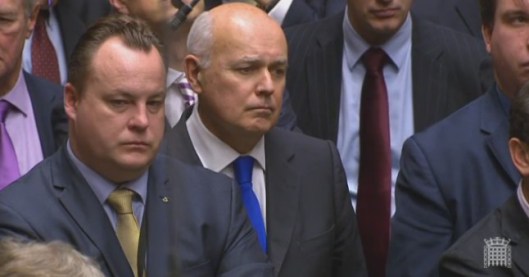 By John Pring Disability News Service Thursday 22nd October 2015
By John Pring Disability News Service Thursday 22nd October 2015
The government has rejected three key recommendations by a cross-party committee of MPs that were aimed at improving the safety and transparency of its benefits sanctions regime.
In its response to a report published earlier this year by the work and pensions select committee, the Department for Work and Pensions (DWP) this week rejected a call for a full, independent review of the sanctions regime and the conditions placed upon benefit claimants.
DWP also rejected a call for ministers to state how many secret “peer reviews” had been carried out into the deaths of benefit claimants who were subject to a sanction at the time they died, and to say what measures were taken by ministers as a result of those findings.
The existence of the internal DWP reviews was only exposed by Disability News Service last autumn, and ministers have refused so far to publish their content, summaries, conclusions or recommendations, even with personal details redacted.
The government rejected a third key recommendation of the committee, to set up a body modelled on the Independent Police Complaints Commission (IPCC) that would carry out a review – if requested by relatives – into all deaths of working-age claimants of out-of-work benefit claimants.
DWP said it had already made improvements to the system of sanctions – where benefit payments are stopped for a period if a claimant has not met a particular condition – following recommendations made last year in a review of jobseeker’s allowance sanctions by the former Treasury advisor Matthew Oakley, and that it now wanted to “focus on embedding those changes and improvements”.
It added: “As with all our policies, we are keeping the operation of the sanctions system under constant review to ensure that it continues to function effectively and fairly and that, where we identify an issue, we act to put it right.”
DWP said it was unable to say how many reviews there had been where the claimant was subject to a benefit sanction at the time they died, because of “the high risk that the disclosure of that information may lead to identification of one or more of the individuals concerned, and thus breach the department’s obligations of confidentiality”.
It also argued in its response to the committee’s report that a new IPCC-type body was not needed because of existing routes open for relatives to seek reviews, through their MPs, the court system, benefit tribunals, complaints to DWP, and through the Parliamentary and Health Service Ombudsman.
The department also said that it would be:
“simply unworkable and disproportionate” to investigate “what might amount to every death of a working age benefit claimant”.
Iain Duncan Smith, the work and pensions secretary, did accept some of the committee’s recommendations, including an agreement to trial a system in which benefit claimants would be warned that they were facing a possible sanction, and given 14 days to produce evidence showing why they should not be punished.
DWP has also issued “comprehensive guidance” to staff on how restrictions on availability and the type and hours of work that people on jobseeker’s allowance can do “can be varied to take account of the claimant’s physical or mental health conditions and caring responsibilities”.
And it has developed new guidance for Work Programme providers on sanctioning disabled claimants of ESA.
Duncan Smith said he would also “consider” extending the definition of groups seen as being “at risk” to include people with mental health conditions and those who are homeless – it already includes all ESA claimants – which allows them to seek access to hardship payments the moment a sanction is applied.
But the Employment Related Services Association (ERSA), which represents Work Programme providers, was critical of the government’s changes.
Kirsty McHugh, ERSA’s chief executive, said:
“We welcome the recognition by the secretary of state that the sanctions system is in need of reform, but are concerned that the changes today don’t go far enough.
“For some jobseekers, receiving a sanction can act as a ‘wake up’ call. However, for the majority, the sanction system is more likely to hinder the journey to employment.
“Jobseekers move into work quickest when they feel positive about work and thus sanctions should only be used as a last resort.”
Related News : IDS slammed over “pathetic” response to sanctions probe by sister of man who died after lifeline axed ~ The Daily Mirror 22nd October 2015

No responses yet